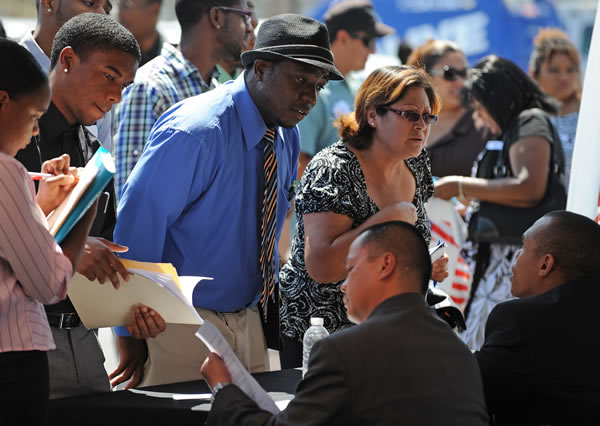Morning Bell: A Jobless Labor Day
Mike Brownfield /

Job-seekers (L) talk to employers (R) during an outdoor job fair at the Crenshaw Christian Center in South Los Angeles August. 31, 2011.
For 14 million unemployed Americans and their families, this Labor Day will not be a happy one. Instead of enjoying a day off of work, they’re suffering a disturbing trend under the Obama economy: Jobs are not being created, the unemployment rate has not improved, and the economy is at a near standstill. Even worse, the labor market’s stall might be turning into a decline.
And today, in Detroit—which in July had the highest unemployment rate of any metropolitan area in the country—President Obama is due to stand with labor presidents including the AFL-CIO’s Richard Trumka, Teamsters’ James P. Hoffa, and the UAW’s Bob King to tout his bailout of the auto industry and his yet-to-be-disclosed plan to turn the economy around.
The Big Labor backdrop is ironic but not surprising. The union movement has helped lead to the staggering loss of manufacturing jobs in the United States, and the demands it has made on employers and governments help create the very conditions leading to the tragic unemployment in Detroit and across the country. But they are strong political allies of the President—having spent $1.1 billion on politics and lobbying in the last election cycle—and they continue to hold a prominent seat at the table.
It follows, then, that President Obama continues to put the institutional interests of unions ahead of America’s economic well-being. In a new paper, Heritage’s Rea Hederman and James Sherk explain that the latest example comes from the National Labor Relations Board (NLRB), which issued several rulings recently undermining employer and employee rights: snap elections, restricting secret ballot elections, and a new rule that allows unions to cherry-pick which workers get to vote on unionizing. All these rules are designed to facilitate organizing companies whose workers are unenthusiastic about unions.
Private-sector workers have a right to unionize, of course. Management gets the union it deserves. But unionization has economic costs, as Sherk and Hederman write:
Unions make businesses less competitive and discourage investment. This reduces job growth. Studies show that jobs fall by 5–10 percent at newly organized firms. Going forward, employment grows by three to four percentage points more slowly at unionized businesses than at otherwise identical non-union companies.
The result can be felt in places like the Motor City as unionized manufacturing employment plummets. Since 2005, GM shed half of its unionized workforce. Nationwide, unionized manufacturing employment fell by 80 percent between 1977 and 2010, while non-union manufacturing employment decreased by 6 percent over that same time period. Unions are feeling the effects, with membership falling by over 600,000 workers in 2010 alone. If workers are happy without a union, the government should not foist one on them.
Sherk explains why unions are on the decline:
Union membership has fallen because traditional collective bargaining does not appeal to most workers. Polls show that only one in 10 non-union workers wants to organize. This makes sense: in the competitive private sector, unions can do little to raise their members’ pay. Additionally, most workers like their jobs and believe they are on the same side as their employers.
Fortunately, Big Labor doesn’t have to be the only game in town. Workers want a say in their workplace, but they’re becoming increasingly aware of unions’ limitations. Private-sector unions have little power to raise their members’ wages, while employers have learned that respecting their employees makes good business sense. That is why large majorities of workers say they are satisfied with their jobs and their bosses.
Unions, though, aren’t going to go down without a fight. That’s why they’re lobbying the Obama Administration to protect their interests. Unfortunately, the President is obliging, whether it’s by changing the rules of the game to make unionization easier, preventing private employers from locating in right-to-work states—as the NLRB is doing with Boeing case in South Carolina—or pushing for more government spending on infrastructure projects that employ primarily union members (while leaving the rest of the economy in the lurch).
Meanwhile, Americans are suffering from the President’s decision to satisfy unions before reducing unemployment, all while there are more signs of a declining labor market than there are of a recovery. There are things Congress and the President can and should do to improve the business climate, such as repealing Obamacare, opening the door to domestic energy production, preventing harmful regulations, passing pending free trade agreements, and reining in the NLRB. Labor Day 2012 can be brighter than today, but Congress and the President must choose the right path to help get us there.
Quick Hits:
- The U.S. Post Office’s deficit will reach $9.2 billion this fiscal year. A big part of the problem? Labor amounts to 80 percent of its costs—compared with 32 percent at FedEx.
- Teamsters president James P. Hoffa says it’s “unpatriotic” for Apple Inc. to open factories and stores overseas instead of in the United States.
- Thousands of Libyan rebel forces are waiting for orders to attack the pro-Qadhafi stronghold of Bani Walid, all while negotiations between town elders and the rebels continue.
- Famine is spreading in Somalia, leaving four million people in crisis with 750,000 at risk of death in the coming four months, according to the United Nations. Tens of thousands have already died, half of them children.
- President Obama postponed costly new ozone standards in a move that may have saved millions of jobs, but there is much more work to be done to halt the EPA’s regulatory train wreck.
